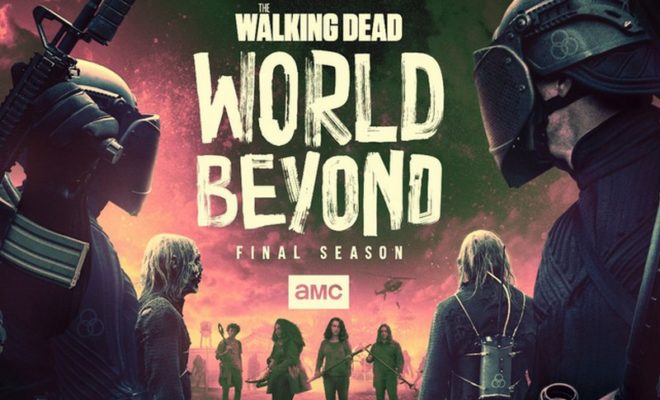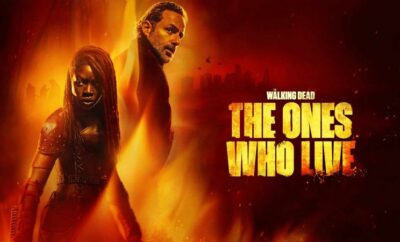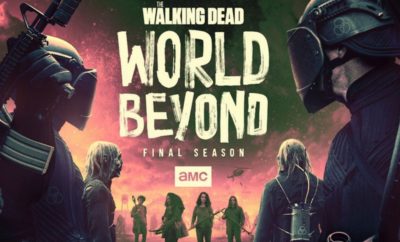
Interviews
Alexa Mansour, Annet Mahendru & Julia Ormond – The Walking Dead: World Beyond
By: Jamie Steinberg
Q) Julia, I’m wondering if you could talk about her morality, because last season, she seemed to be upset about some of the stuff she was doing, but this season, she seems a lot more apathetic. And I’m just curious, is there a line she won’t cross, and is it still bothering her? Kind of your take on it?
Julia Ormond: My take is that Elizabeth is somebody who compartmentalizes what emotion she will show to what person. So, if something is bothering her profoundly, she would have trouble showing that to somebody she’s intimate with, just because of her personality type. So, yes, but I think really what happens with Elizabeth is her belief in what they’re doing. What happens to her belief in what they’re doing in season two. In season one, for me, she’s utterly, utterly committed to an agenda that’s necessary. They’ve identified that Hope actually has something that could be really critical to the survival of mankind – if she comes in with the right attitude. She doesn’t become, she doesn’t spread, she doesn’t bring in the anger; she goes along with the plan of what they’re meant to be doing and that she’s productive and effective in her time there. And I do think that it’s not black and white, or I hope it’s not black and white. It’s more kind of gray. It’s like she has to sign up for something that she’s not happy about, but I think people do that in war all of the time. In the military you accept that there are people who are going to die, and you accept the tragedy. And I think we as a populace accept the tragedy of collateral damage. So, I don’t think it’s as much of a pivot as I wish it was in the world.
Q) And then for Annet and Alexa, obviously, Huck has been changed by the two girls, even though she said she hasn’t. Can Hope trust her? And for that matter, can she trust your character, because obviously, you’re more about your sister right now.
Alexa Mansour: I think Hope can learn to trust her; whether or not she does is different story, but I think there’s a lot that Hope doesn’t know, and she has to take that into account. And just like Hope did a bunch of crazy things, or Hope would do a bunch of crazy things for her sister and the people that she loves and to protect them, I think Huck was kind of put in a tough situation as well. But Hope is pretty scarred after what happened in season one, so it’s gonna take a lot if Huck wants to rebuild that relationship with her.
Annet Mahendru: Yeah, Huck’s in a really bad spot. At this point, Hope’s just looking at her like, “You’re crazy; I don’t ever really want to talk to you again.” So, I don’t know how she’s gonna get out of this. It’s just looking pretty bad and things are so entangled. She’s relieved to be back, but it’s looking really [like] she’s sort of in the worst position she’s been thus far. In a way, she’s in prison the way Hope is too, because of this web of lies, right? And all these people out there who know things about the CRM that they shouldn’t have known and that’s Huck’s family now, too, that she obviously feels alignment with and maybe more so than she does with Elizabeth at this point. And as we know, there’s more family at the CRM now that Huck has some entanglements with that are problematic. So, it’s just the question you know, it’s funny when Hope and Huck are sitting in this sort of dog kennel…where they have their conversation like, “Hey, this is a great place for all of us.” It’s so ironic, because they’re just both in prison, really, and it seems like there’s no way out of this all, and is this a better place? Are they safe? Or, actually, have things just gotten worse?
Q) Alexa, I love Hope’s friendship on screen with Elton – or I guess their former friendship, as it were. Will we get to see them mend and is there hope for them to mend this relationship?
Alexa Mansour: I don’t know if I can tell you what happens with Hope and Elton (Nicolas Cantu), but what I can say is that I think there’s always that room or the possibility of mending something. I think if both people are on the same page and they each get to get their side of the story out, I think that there’s a very strong possibility that they could be friends again. And they’ve all been through so much that they realize that sometimes you have to do things or things happen that are out of your control. And I think when you care about someone, you understand that. I would appreciate the honesty, so I hope so. I hope they do get to mend their relationship.
Q) Julia, what kind of backstory were you given about Elizabeth’s connection with CRM? And will we be seeing that play out, maybe explore her backstory a bit this season?
Julia Ormond: That’s super hard to answer because I think some of it – Yeah, that’s hard to answer without doing spoilers. And I think some of the backstory, I think we do have supporting roles and basically Elizabeth is this sort of character. It’s not always helpful for the backstory to come into the story. But, um, yeah, that was kind of vague. I think the biggest thing is that she’s a real believer, she signed up for this philosophy and she thoroughly believes in the choices that they’re making and what they need to do in order to save mankind. And then there’s this greater detail in that. But I don’t want to answer it anymore because I don’t want somebody like Scott [Gimple] or Matt [Negrete] to go, “Why did you say that? Because we’re going to use that.” They sent us a list, “You may not talk about this, you may not [talk about this.] I don’t know if they sent that to you. I was like, “What can I talk about? I don’t know what to talk about.” So, it’s a little scary. There you go, that was an all over the map useless answer.
Q) Julia, I respectfully have to disagree. I think she’s more than a supporting character because she casts a very big shadow in the story. What’s it like? She manipulates she tests people and when somebody pushes her, she pushes back hard. What’s it like to play all those different aspects and then throw in the fact that she’s a mom, too?
Julia Ormond: A reporter was asking the question earlier in terms of you see her get upset in season one, you see kind of the soldiers get taken off and then she’s upset. And I think for me that upset at that moment is this private moment of grief in terms of I’ve not just done this awful thing to this kid that I frankly liked and was a good soldier and all the rest of it, and the grief around how much people can tolerate, but what is my kid going to think of me when they find out? And I have to tell them? And I think that just packs a punch. And for me what happens with Elizabeth is you see the dehumanization of it, she becomes increasingly disconnected. She’s just disconnected and she’s shutting down. So, she’s dissociating. And it’s at certain moments that I really value that she has actually with her own family that pull her back. And maybe – maybe yes, maybe no – that will actually impact her reevaluation of what they’re actually doing.
Q) For Alexa, Hope is kind of in a new place. We won’t say more than that. And she’s kind of getting acclimated to a lot of different things. And also there seems to be an aura of distrust a little bit. Where is she mentally at this point?
Alexa Mansour: I think she just came from getting so hurt and feeling so betrayed after what Huck did, and she just left her sister; her and her sister just split up, you know, and all the only friends that she really feels like she ever had she doesn’t have them and she doesn’t know what’s happening to them, or where they are. So, I feel like she’s in this spot where she’s like, “Do I let more people in? Because everyone kind of leaves and no one, nothing ever lasts. Anything good that’s ever happened in my life wasn’t lost. It’s turned out to be completely fake.” So, I think she’s a little bit on the fence and has this guard up in this new place that she’s in because she doesn’t want to get hurt again. At least she’s got her father and whatnot but anybody else that’s not really family, that’s not really a necessity in her life, I don’t think she really is trying to get attached to them after what’s happened.
Q) Annet, real briefly, do you feel like she’s a woman without a country right now?
Annet Mahendru: Yeah, the other one got exploded and this one is under attack. Yeah, I mean, she’s always been a woman of her own country, I suppose; of her own reality. So, I don’t know if she particularly needs to be anywhere. She’s not truly attached to anything. She’s a true soldier in a way, going from point A to B, and then she has to keep going. She can’t really sit still anywhere, and you’ll see her coming back to her room and it all seems distant and doesn’t really mean anything anymore because she’s changed so much. So, it’s sort of these pauses in between that a soldier never really knows how to deal with any way, they just like to be away and like to be in these explosive situations. That’s where they thrive. So, Huck’s ready. I think she’s ready for another mission.
Q) Julia, you’ve been working since you were very young. Since high school, at the very least, in acting, and then after that. And a lot of the cast are very young people. Did you have any advice for them? Or did they come to you for any advice
Julia Ormond: They don’t need advice from me. They don’t need advice from me. I might be asking them advice. Hannah, Alexa, did you come to me seeking any advice? Did I ever give you any advice? I don’t remember. No, I don’t think I did. I’m not much of a sharer in that respect.
Annet Mahendru: Honestly, watching Julia and just being in the presence of her is your advice and your lesson and your inspiration and you just respond to the person, the greatness that’s in front of you. So that’s everything.
Alexa Mansour: Yeah, Julia is a force to be reckoned with. I know every time I go on set with her, I’m like, “How are you doing this? I don’t understand.” So, if there was a person I was going to go to advice for, it would probably be Julia.
Q) Elizabeth is such an insanely manipulative character and who really sends chills down my spine. So, as an actor, what is your process going into this character and how do you prepare yourself before you act the hell out of her?
Julia Ormond: So, everybody sees her as manipulative and I guess there’s a part of me that once you find that justification, I think it was I was talking to Jamie about that in the beginning. My justification is that she is part of the military; there’s very few human beings left as far as they know. They work from the fact that they can have. So, they don’t know if there’s anybody else left in the world, they don’t know if they’re the only human beings left. So, they are working towards building hierarchy and structure and laws, and the ethics have just gone to hell because their ethic has to be protect the border of whatever the human race is. We can’t let other people, we’ve got limited resources, we can’t necessarily share them with everyone. We need to make relationships with people outside of it. And that’s her MO. That’s where she has to end up making tough decisions that from my own perspective, people who are in the military, they’re making those decisions all the time. Somebody who’s being killed somewhere on our behalf right now. And we kind of have gotten to a little bit of, it feels it feels globally as if there’s a little bit of weird acceptance around it, because it’s too painful to confront. So, there’s a piece of Elizabeth that’s an amplification of that. It’s like I go into a state of denial, because it’s just too painful to accept the reality. And then that state of denial, I mean, she’s disconnected; she disconnects from personal relationships as well. And then I think once you have that, you can sign up as a believer. But you can believe in something and not be happy about the consequences of it. You can believe that, “Oh, I had something wrong with my leg and the doctor’s telling me that I have to have it cut off.” It’s kind of like, “Okay, I’m not particularly thrilled about it, but this seems like that’s the best plan going forward.” But I think for me, it’s kind of getting into it. Like I watched some of it last night, I was like, “Oh my god, she redefines resting bitch face.” This just makes you so grim. But I think that’s what the sadness and the resignation is. There’s a harshness to the choices that she’s making and so that kind of shows on the exterior.
*CONFERENCE CALL*





You must be logged in to post a comment Login